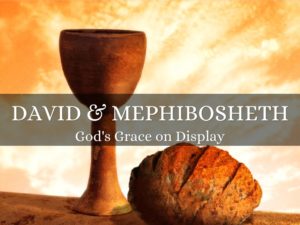
Being rejected more than once can be a bruise that will not heal quickly. It seems to linger on until the next blow or rejection. Sometimes you get to a point where you don’t feel quite as bad. It becomes an acceptance of the off-color places in your soul. It can even get to a place where you feel as though you deserve the abuse. You feel like you don’t belong in the mainstream. That you belong on the outside edge. A place where you expect a disapproval.
In the Bible, a person like this would have been called unclean. You start to feel like an outcast. You just want to give up. You don’t want to be around those who tell you over and over, “You don’t belong here.”
Then comes the story from the Old Testament. He was the son of Jonathan, who was the son of King Saul, Israel’s first king. You see Mephibosheth was disabled. Both of his feet were useless. In those days he would be called an outcast, a mistake, a person who didn’t belong.
When King David invited him and the rest of the family to join him to eat with him, he reacted just like someone who had been rejected so many times before.
In response to the invitation of King David, he hung his head down low and Mephibosheth said, “Who am I that you pay attention to a stray dog like me?” 2 Samuel 9:8. You see rejection had taken its levy on his heart. He could not see himself in the presence of the King, let alone eat with him. He had taken all the worlds opinion of him and deep down in his soul, he didn’t think himself worthy to be acknowledged, let alone invited in.
The church is becoming the instigator of pointing fingers at the different, the ones that don’t quite fit the mold. And in response, those who need acceptance and love the most have started to believe the lies that they don’t belong. That they don’t matter. That the “church” will never have a place for them.
And yet King David, the man after God’s own heart, was not deterred. He insisted to Mephibosheth: “You belong here.”
And the story goes: Mephibosheth lived in Jerusalem, taking all his meals at the king’s table. He was lame on both feet.” 2 Samuel 9:13
Christians, churches, humanity — this must be our attitude toward anyone and toward any person or group whom society has deemed “less than.” The fringes of society, the ones who are rejected turned away and told they don’t belong.
We must — like King David — insist otherwise.
Because if you are a human being, then you are indeed an image-bearer of the Most High God. So hear me when I say: You belong here. You belong on this earth. You belong at the King’s table. You belong at the feet of Jesus.
Comments?
